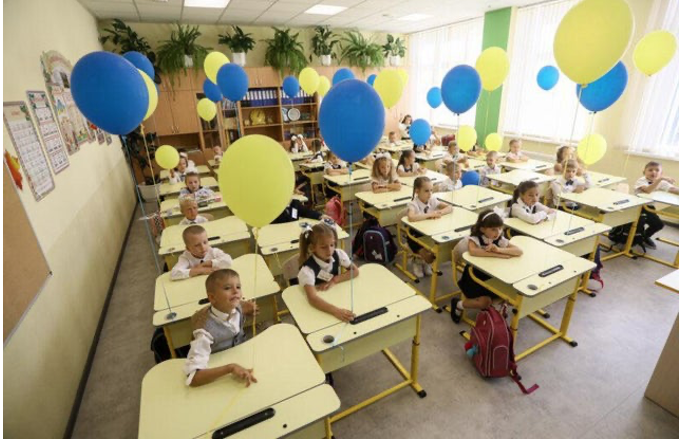CommentsGUEST COMMENTARY - For all of his lip service to Mother Russia and his support for Russian speakers around the world, neither Putin nor the Communist apparatchiks before him, nor the Tsars before them, really understood the power of a mother tongue.
Over the past few years Putin has issued Russian passports to 720,000 Russian-speaking Ukrainians in the Donbas area of eastern Ukraine. This is part of his long term plan to invade and re-annex what he believes in his heart of hearts is part of Mother Russia, a region he visited as a young KGB officer growing up in the Soviet Union.
The area we know as central Ukraine was settled by the Cossacks in the mid-1600s whose language evolved into today’s Ukrainian, while Crimea was controlled by the Turks, and the rougher regions to the east, what became the provinces or Oblasts of Donetsk and Luhansk, were primarily inhabited by nomadic tribes.
During the Industrial Revolution, the coal reserves of the Donbas increased its value attracting many ethnic Russians to work in the mines and the resulting heavy industry.
According to the Russian Imperial Census of 1897, Ukrainians made up 52.4% of the population of the Donbas, while ethnic Russians comprised 28.7%.
From 1917 to 1933, in response to partisan uprisings in the wake of the First World War, the Bolsheviks engaged in a policy to bury the Ukrainian culture by eliminating, exterminating, and deporting the entire population, culminating in Stalin’s deliberate starvation of native Ukrainians.
During the Nazi occupation of 1941-42, hundreds of thousands of civilians were killed and tens of thousands of more were deported to Germany as forced labor. The war destroyed much of the region while famine eviscerated even more of the population.
The Soviet rebuilding drew immigrants from Russia quadrupling the numbers of ethnic Russians in Donetsk and Luhansk within 30 years. Although many integrated with the local Ukrainian population, dissatisfaction arose in the wake of the collapse of the Soviet Union when Kyiv refused to make Russian an official language.
In March of 2014, following the Russian clandestine invasion and subsequent annexation of the Crimea, large swaths of eastern Ukraine experienced unrest and Moscow-backed separatists in the Donbas started their own civil war against Ukraine’s government.
The separatists declared two breakaway republics – Donetsk and Luhansk, and fighting has continued sporadically over the past eight years. As part of the opening rounds to the Russian invasion, Putin officially recognized both republics as independent from Ukraine.
What is a culture?
Primarily Russian-speaking is not necessarily a culture. Culture stems from family and is heavily dependent on one’s birth language.
Language is family. Even when you emigrate it comes with you, even as a minority it is the star leading your life, and how you comprehend and process the world around you.
It is your mother tongue, the first words you hear. It is the mother of your soul. Even in families who have completely assimilated, it remains in the songs sung, the endearments bestowed.
Speaking to someone in their native tongue makes them feel warm and fuzzy, reach out to help you.
What’s in a language?
It is through and for their native language that people live and fight back.
The European settlers in North and South Americas have tried cruelly but unsuccessfully to suppress the native Indian dialects because it is through their language, that heritage, that the image of the heroic Indian survives. A threat to white ascendency.
Great Britain tried to kill off the Maori and Aboriginal languages in New Zealand and Australia as well as the Gaelic and Cymric of Scotland, Ireland and Wales but all are being invigorated and celebrated as the hearts of those cultures.
Beijing tried to stifle Cantonese but it has spread from Guangzhou through south-eastern Chia, Hong Kong and around the world.
However, the roots of language and culture run even deeper have spiritual and emotional components that spring from a very different logic than is taught in school. And that can be very, very complicated.
Although close to 60% of the populations of Luhansk and Donetsk were ethnic Ukrainians and less than 40% were ethnic Russians, over 70% of their residents speak Russian as their primary language. For decades they have received their (fake?) news from Russia and are more susceptible to Putin’s exploitation of their grievances against Kyiv.
However, Mariupol, although less than 50% ethnic Ukrainian and traditionally Russian-speaking, has fought the Russian invaders through the streets, in the fields and on the hills and still refuses to surrender.
And while Putin honestly believe that what he says is the truth and that all who disagree are treasonous, what power does that have in the face of another mother culture.
What is clear is that Moscow will face the same problem as Kyiv does now if it takes over the Donbas.
And Putin will face a far, far greater war of attrition if he tries to swallow Ukraine whole. One that will curse him, and Russia, to the end of days.
(Liz Amsden is an activist from Northeast Los Angeles with opinions on much of what goes on in our lives. She has written extensively on the City's budget and services as well as her many other interests and passions. In her real life she works on budgets for film and television where fiction can rarely be as strange as the truth of living in today's world.)






